For the Birds: With my back toward the room
On trauma, hypervigilance, and autism. Plus: The February Resiliency Circle is happening *tonight*!
Thanks for being here! I’m on a mission to serve others through writing & mentorship, and I’m doing this work as a self-employed neurodivergent human. Your support has a bigger impact on my life than you likely know. Please know it! When you can, thank you for reading closely, sharing widely, and upgrading to a paid subscription.
Dear paid readers: The February Resiliency Circle is happening tonight at 5:15pm PST! Zoom link here. See you soon <3
The gym in town has seen better days. Maybe that’s what makes it a gym and not a spa.
I never see anyone wiping things down. The steam room just sits there, permanently wet, and two ugly industrial pipes, shapes that would be well-hidden in a manicured lawn, stick out of the wall, sputtering water at inconsistent intervals as if by accident.
Trust me: “Sputter” is the word for these pipes. They sound like a cross between a nearly dead car engine and a slow, controlled fart. The room gets temporarily steamier and I close my eyes, willing myself toward calm and away from laughter.
Sometimes I open my right eye and peek at M, wondering if the noise is startling him, too. But his eyes stay closed more often than mine do, his will stronger. His calm nearer.
I’ve not tested many machines at the gym, because the only way I can manage going at all is by making a beeline for what I already know—in this case, the rowing machine—creating routine and familiarity through as few trips as possible lest I spook myself into never coming back.
Half of the machines I’ve tried don’t work anyway, their digital displays broken or their buttons awkwardly flush with the screen, no give. Or they work fine, but a once invisible outer layer on the handles is making itself visible by slowly peeling away, like gross plastic on a new phone screen.
Rather than attesting to the hard physical work of hundreds and hundreds of bodies over time, the grunginess of it all seems to say, yeah whatever. I guess we’re here.
I’ve never been a gym person, barring that period of time in my early 20’s where, in the thick of disordered eating and unacknowledged trauma, I would sometimes drive to the 24 Hour Fitness in Medford at 11pm and climb the elliptical ferociously, as if I might feel better about myself before morning. I remember the pilled, red hoodie I always wore, and the giant screens and out-of-sync music, and my fear of changing out in the open aisles of the locker room, the hypervigilance with which I took off and put back on one shoe at a time, trying desperately not to let my socks touch the floor as I hovered before the toilet and privately changed in & out of my workout pants.
But I am trying to go to the gym again, because a membership is now included with the rowing studio my partner and I already pay for.
The rowing studio is different than the gym. Special. Black lights, nothing fluorescent; everything set up to avoid distraction and comparison. It only houses water machines, which means it’s possible, with the right amount of focus and effort, to close your eyes until you think you’re on the river.
But the gym? The gym might be one of the least autistic-friendly places I’ve ever stepped foot in. Glaring lights. Smells that puddle. Machines crowded in a single giant room, so that one discrete personal bubble can’t help but lay flush against every other one nearby. Flush at best. At worst, punctured.
As if it’s normal to be this intimate with other people you don’t know, all these muscly men. The kind of men I’ve had nothing to say to in many years.
And even when I did have something to say to them, I think to myself while rowing swiftly on the gym’s sub-par magnetic machine—the soft swish of water replaced with hard, repetitive clicking—they were mostly just conduits for my father.
Then, there are the eyes—so many sets of them. So many sets of eyes looking, and mine, too, looking and bouncing and shifting, forgetting how to be still or focused, not wanting to be looked at—not wanting to be perceived by others, a common and, in my strong opinion, under-described autistic trait, one that’s heightened in my own body after years and years of trying to ensure the opposite, especially when in rooms full of muscly men—and so I look around with darting laser-eyes, determined to shut everyone else’s with my own.
I am trying to exercise more than once per week now. Now, I am getting older. I am in a lot of pain this season, running into a previously undeveloped capacity to deal with bodily discomfort. (Dissociation is a difficult state in which to build somatic tolerance.) It’s something I haven’t had to deal with much before now, a combination of good luck and brain-centered living.
The pain…it isn’t that bad. I am perpetually tense—nothing new—and I’ve never been able to tell where the tension lives in me. Neck? Shoulders? Back? I took karate for a short while during grad school, and the instructor would always say things like, notice the tightening of your bicep, or, flex your muscle, not your bone. He’d touch my arm gently, with consent, and I’d feel the bad-warm feeling of not knowing which kind of pouty face to make at him, sexy pouty or daughterly pouty? It was just so nice to have kind male eyes on me.
He gave the instruction like it was obvious: Just do this, and don’t do that. But I never knew what he meant. I mean I could kick my leg somewhat high or punch my arm with focused anger all day, but I didn’t know how to be more specific than leg up, arm forward. I didn’t know how to know that my muscles were different from my bones. I didn’t know how to distinguish one inside part from another.
Then, a few months ago, I woke up in pain. I must’ve slept on my neck funny, I told M, thinking it would right itself in a couple days. It didn’t.
Then I got sick—just a very bad cold. When everything got better except my throat, I grew despondent. Mucous, too much of it, like there’s something in there I need to cough up. But I can’t cough it up; I don’t know how to, or it just won’t budge. Sometimes I gag out of nowhere. One evening, I confess to M that the gagging came on so rapidly while driving home just then, curry for the two of us in the passenger seat, that I had to jerk the car to the side of the road and spit up in a Taco Bell napkin I found in the glove box.
Maybe you should see a doctor, he suggested warmly.
I know. You’re right. I scheduled an appointment the next day.
But a part of me wondered: Doctor, or astrologer?
Every horoscope website will tell you that each sign rules a different part of the body. Taurus—lover of comfort and strong thinking, and the sign in which both my luminaries reside—rules the neck. “Taurus people may be prone to throat infections, sore throats, laryngitis, and swollen glands,” some generative AI results tell me.
I am so Taurus that bulls put stickers of me on their hydroflasks.
“They may be vulnerable to neck pain and minor injuries,” google adds.
Throat problems and neck pain.
As if my insides are trying to line up with my outsides.
Finally.
On the wolf moon in January, I drew cards.
I’d started to conceive of this throat / neck situation, in addition to its physicality, as representing a thing in need of purging, something with an emotional dimension and which I am now, in the year of our lord 2025, being tasked with coughing up. With spitting out. I resorted to cards because I wanted any indication whatsoever of what this thing might be, as well as some sense, even the faintest one, of what might help me purge it.
So I drew a card for the stuck thing:
Card 41, “protected.” From Stacy Jane’s Begin oracle deck.
And then I drew a card for what might help get it out:
“Distraction.” From MJ Cullinane’s Urban Crow deck.
I looked at the cards and felt pissed. They didn’t make any sense—if anything, they seemed reversed. Isn’t distraction usually a problem? Wouldn’t protection make better sense as the second card, the aid? I mean isn’t that what I need after all these years: to feel safe?
I laid them flat on the altar but felt sure I’d put them away soon. Never mind that the layout on the two cards, from two very different decks, mirror each other: The angle at which the main figure cocks its head toward the left, a circular item that represents nourishment resting beneath each one. Or the way a second being (arms, a bird) enters both frames in the upper lefthand corner, intruding on the scene.
Intruding, or beckoning?
At the gym, we scan our tiny membership cards to check in, then walk straight to the rowing machines, which, without water in them, are surprisingly lightweight. They live upright against a wall in the far left corner of the main workout room. I hop on my tip-toes and pull the end of one machine down, leaving its orientation as-is; once seated, I continue to face the wall.
I’ve always been one of those people who hate sitting with their back to the room, a so-common consequence of trauma that it feels cliché to write it down. I like the feeling of sturdiness behind me. I prefer to see what else is happening in the room, for sound and image to line up.
But at the gym? At the gym, where I enter the building at almost max capacity for sensory input? Where noise and scent and all those sets of eyes threaten to lift me right out of myself? At the gym, I sit with my back toward the room.
This is what it feels like to move through time and space as a neurodivergent human with C-PTSD: Back to the room, or back to the wall? Do I appease the trauma response, or the sensory overload?
Which part of myself, in this discrete moment, needs the compassion more?
It isn’t always this black and white. But sometimes, it is.
Sometimes you can’t do both. Sometimes it can’t be both, because one is a holding on, and the other is a letting go.
In the one, you are part of a much larger room. In the other, you are the room.
Inside, or outside: Which part of you will you attend to in this moment?
Well? Spit it out already.
I left the cards on the altar for a few more days, mostly forgetting about them.
And then, without trying to, I saw it.
Card 41, “protected.”
Protection.
Hypervigilance.
I am so fucking tired of the work of being good, I tell my therapist. We talk about self-monitoring. Self-policing. I describe a psilocybin-induced image I’ve been carrying with me since the start of winter: There she is, a young part of me—12, maybe 13, though she feels older. She’s stacking cardboard boxes, one after another, on an endless conveyer belt. Or there’s not even a belt, just the dreamy non-logic of more space filled with more boxes. The task is never finished. She doesn’t get a break. She did not sign up for this job in the first place.
How long has she been stacking boxes? my therapist asks.
There is no answer to the question because there is no before. It’s the only job she’s ever had. It has entirely defined her existence. It’s the only way she’s ever used her time. She doesn’t know how to imagine something else.
In the vision, guided by mushrooms, I see it: Tears, and pure vibrating exhaustion. How hard she has been working, and for so, so long.
Hypervigilance.
The thing stuck in my throat. In my neck. In the place where brain meets body, that vulnerable hinge.
And what, I wonder, could become possible in a moment of less vigilance, of less permanent attention?
A lessening of the impulse to protect…
The slow turn of your neck in a new direction…
So that you may finally be capable of being distracted by something.
The healing gift of such an experience. The shock and joy of it.
Not the distraction itself, but the feeling that you’re safe enough to look away.


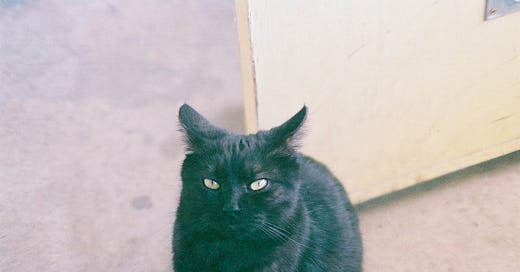




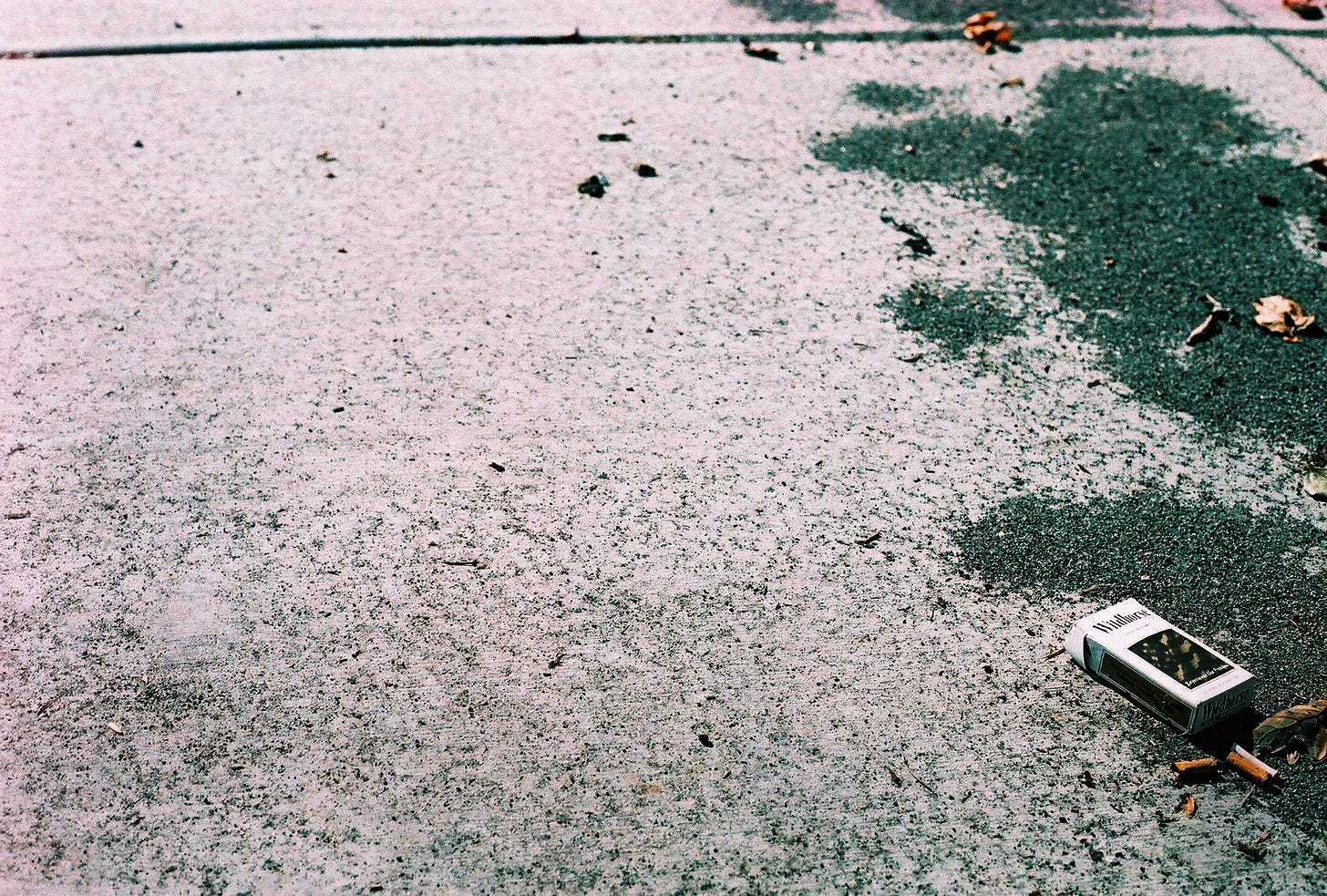

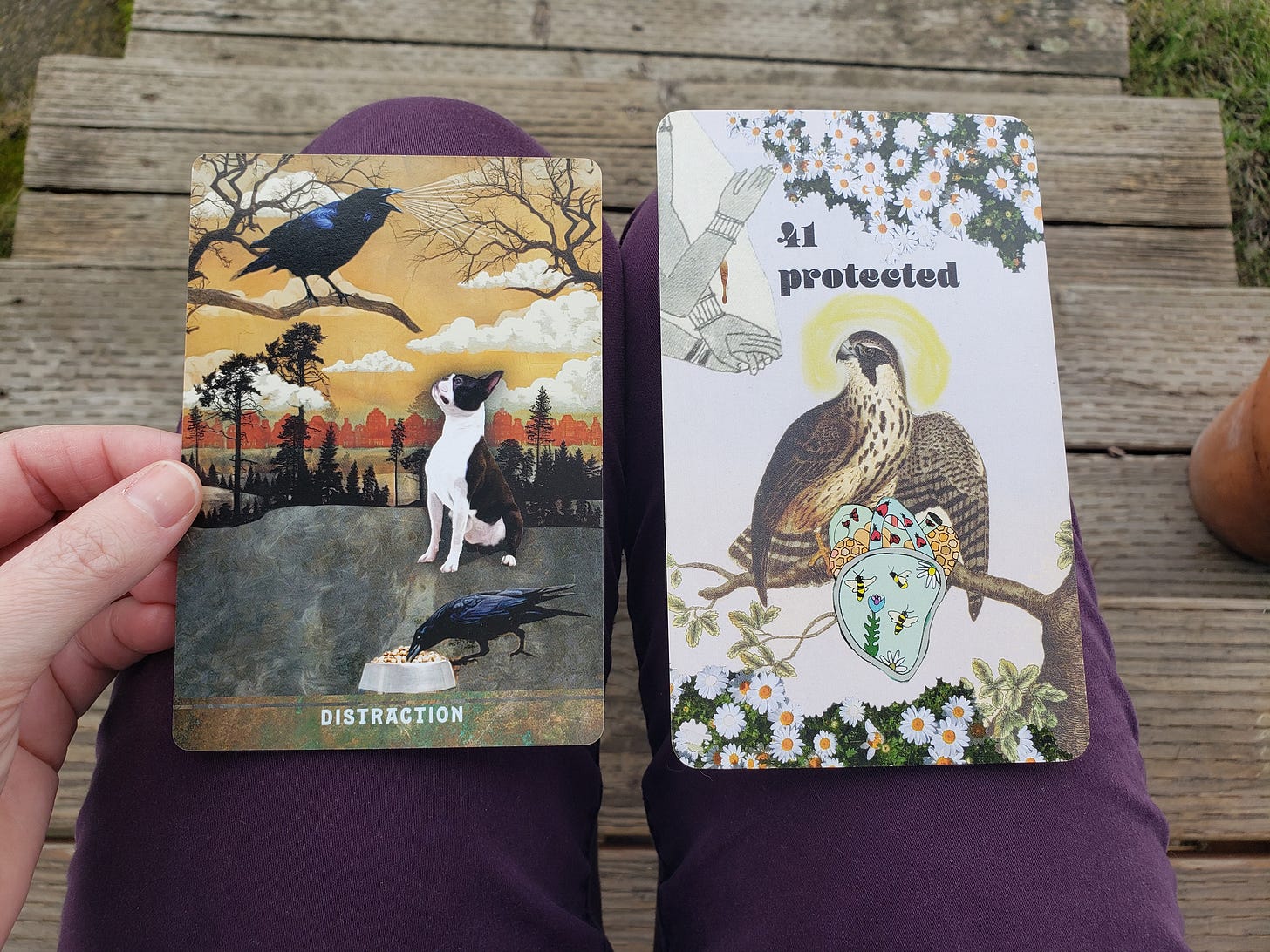
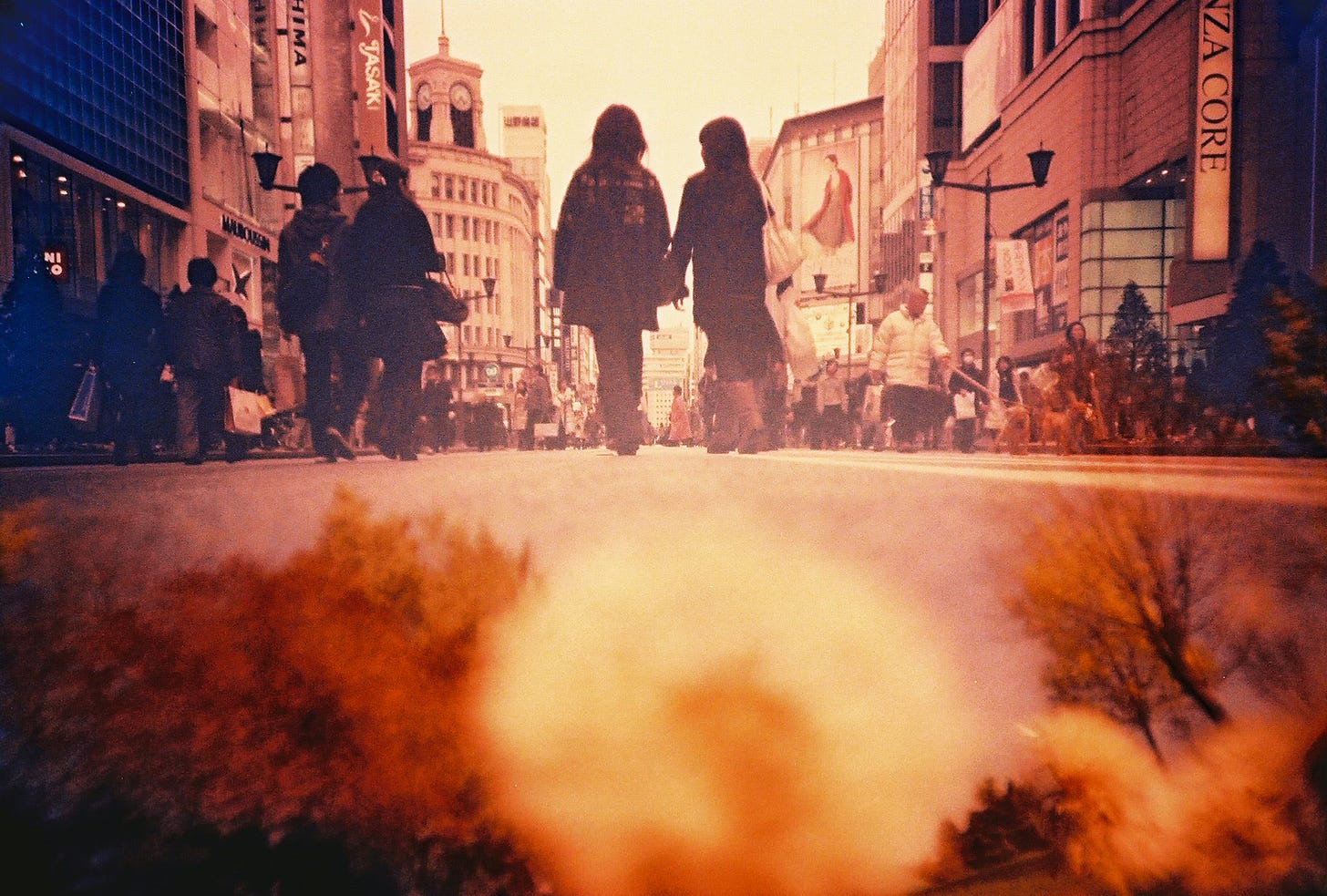
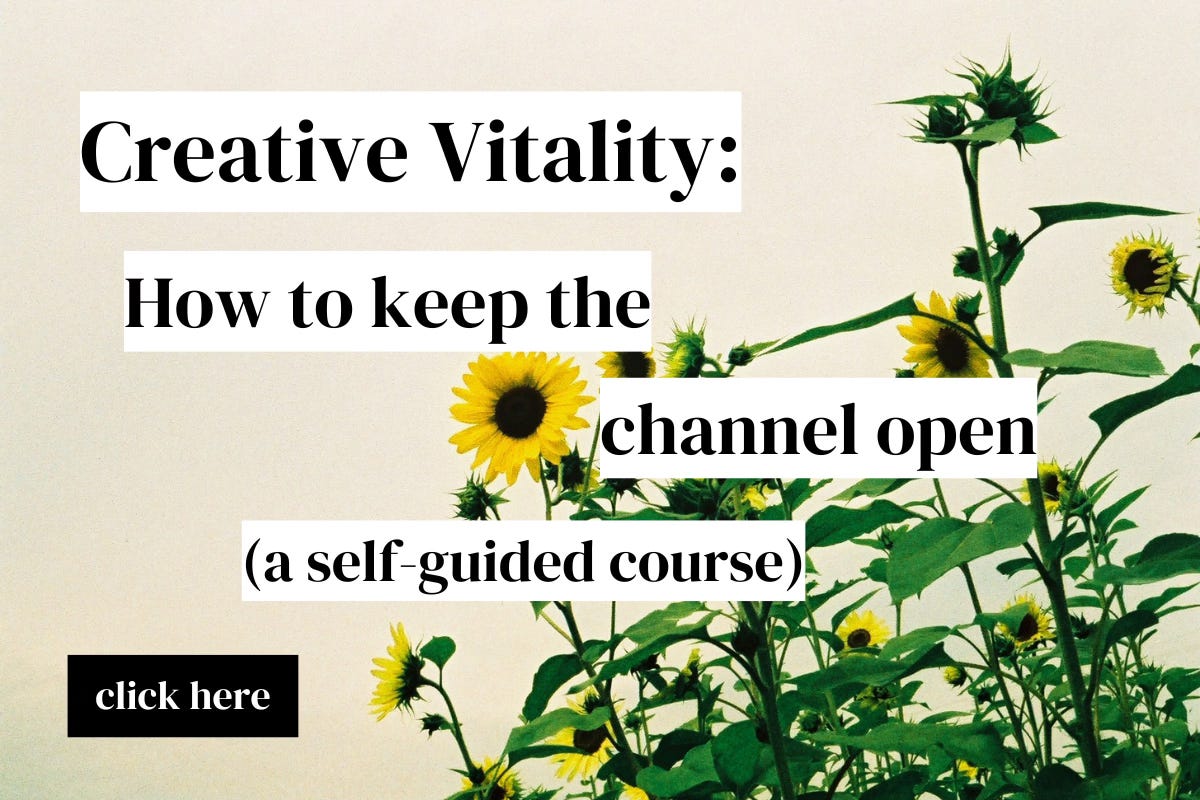
Sarah this essay is really profound. I was absorbed by it entirely, feeling how much of what you expressed I experience as well. And your writing style is so immediate and fun. And then there it was, the Distraction card, and I almost jumped out of my seat with excitement. Distraction has been one of THE HEALTHIEST things I’ve learned since I developed the dizziness. It’s been crucial because I don’t think we can be distracted if we don’t feel safe. So every time we let ourselves/our minds wander, not fixate, we are essentially telling our brains, “I am safe.” Hyper-vigilance then calms, symptoms even diminish. So bring on those distractions!
Sarah, I LOVE this essay. You carry us through your experience and observations in such a perfectly-weaved way. And (sad to say) so much of your experience resonates with mine. I'm sorry about that, but happy to find understanding and insight here.
I especially like this sentence: "Which part of myself, in this discrete moment, needs the compassion more?"